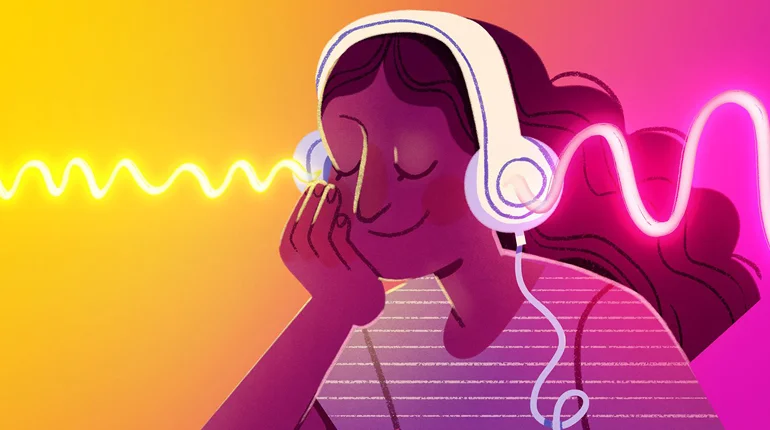Can Binaural Beats Make You Cry?

Now picture yourself seated in a well-furnished chamber, wearing a pair of headphones, into which a steady drone of music floods your senses. The sound is soft yet deep; tears begin to form in your eyes when you know it. Can’t this be attributed to the power of binaural beats? This article will delve into binaural beats and their possible effect on your emotions: can they make you cry? We’re going to dive into the science of these auditory illusions, talk about what it’s like to experience them and discuss what this means for our emotional well-being.
Binaural Beats: What it really means?
Binaural beats are an auditory phenomenon that occurs when two slightly different frequencies are played in each ear. The brain perceives a third tone, which is the difference between the two frequencies. This perceived beat can influence brainwave activity, potentially affecting mood and emotions.
The Science Behind Binaural Beats
- Brainwave Entrainment: Binaural beats are thought to work through a process called brainwave entrainment, where the brain’s electrical activity synchronizes with the frequency of the beats. This can lead to altered states of consciousness, similar to those achieved through meditation or hypnosis.
- Frequency Ranges: Different frequencies are associated with various states of mind. For example, delta waves (1-4 Hz) are linked to deep sleep, while alpha waves (8-14 Hz) are associated with relaxation and creativity.
“Binaural beats can be a powerful tool for altering mood and consciousness, offering a non-invasive way to explore the mind’s potential.”
Emotional Responses to Binaural Beats
While the scientific community is still exploring the full range of effects binaural beats can have, many users report significant emotional responses, including crying.
Personal Experiences and Anecdotes
- Emotional Release: Some individuals find that binaural beats help them access deep-seated emotions, leading to tears as a form of emotional release. This can be particularly true for those who struggle to express emotions in their daily lives.
- Meditative States: Binaural beats can facilitate meditative states, where individuals may experience heightened emotional awareness. This can lead to a cathartic release of emotions, including crying.
Scientific Studies and Findings
While anecdotal evidence is abundant, scientific studies on the emotional impact of binaural beats are limited. However, some research suggests that binaural beats can reduce anxiety and improve mood, which may indirectly lead to emotional release.
The Broader Implications for Emotional Well-being
The potential for binaural beats to evoke strong emotional responses raises interesting questions about their role in emotional well-being and mental health.
Therapeutic Applications
- Stress Reduction: Binaural beats may be used as a tool for stress reduction, helping individuals manage anxiety and improve overall emotional health.
- Emotional Processing: For those who find it difficult to process emotions, binaural beats could offer a safe space to explore and release pent-up feelings.
Considerations and Cautions
While binaural beats can be a valuable tool for some, they may not be suitable for everyone. It’s important to approach them with an open mind and be aware of personal limits.
“As with any tool for emotional exploration, it’s crucial to listen to your body and mind, and seek professional guidance if needed.”
Conclusion
As such, binaural beats are a fascinating way to connect with the emotionality we discuss here. They might not reduce everyone to tears, but they can help you access your emotional responses and provide a route to emotional awareness and health. Whether you’re looking to chill out, let loose some emotions, or see what sound can do, you might want to listen to binaural beats.
If you are interested in digging deeper, try a session with binaural beats and notice how you feel. Note that There is no correct answer here, and everyone’s journey into the mind is deeply personal—what worked for person A may not work for person B. Dive into the experience with an open heart and mind, and you just might unlock different levels of your own sea of emotion.

Ekua is an online content editor for ModafinilHack currently. Before joining our team, she was a senior editor for The Walt Disney Company. Earning expertise and editorial experience, she is now contributing her health, nootropics, and psychology knowledge. She’s a graduate of UCLA, where she majored in English.



